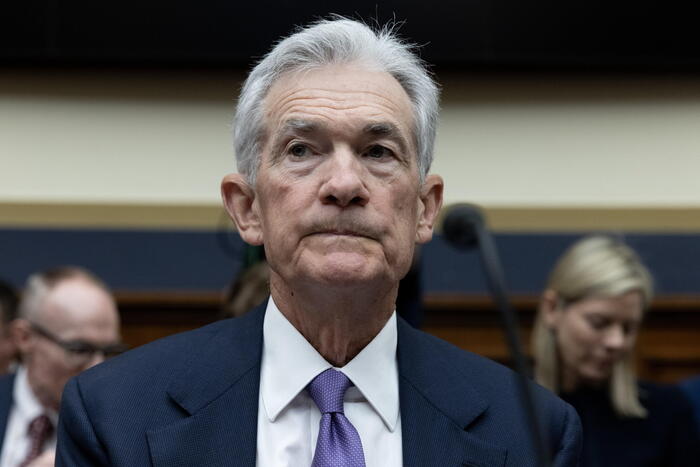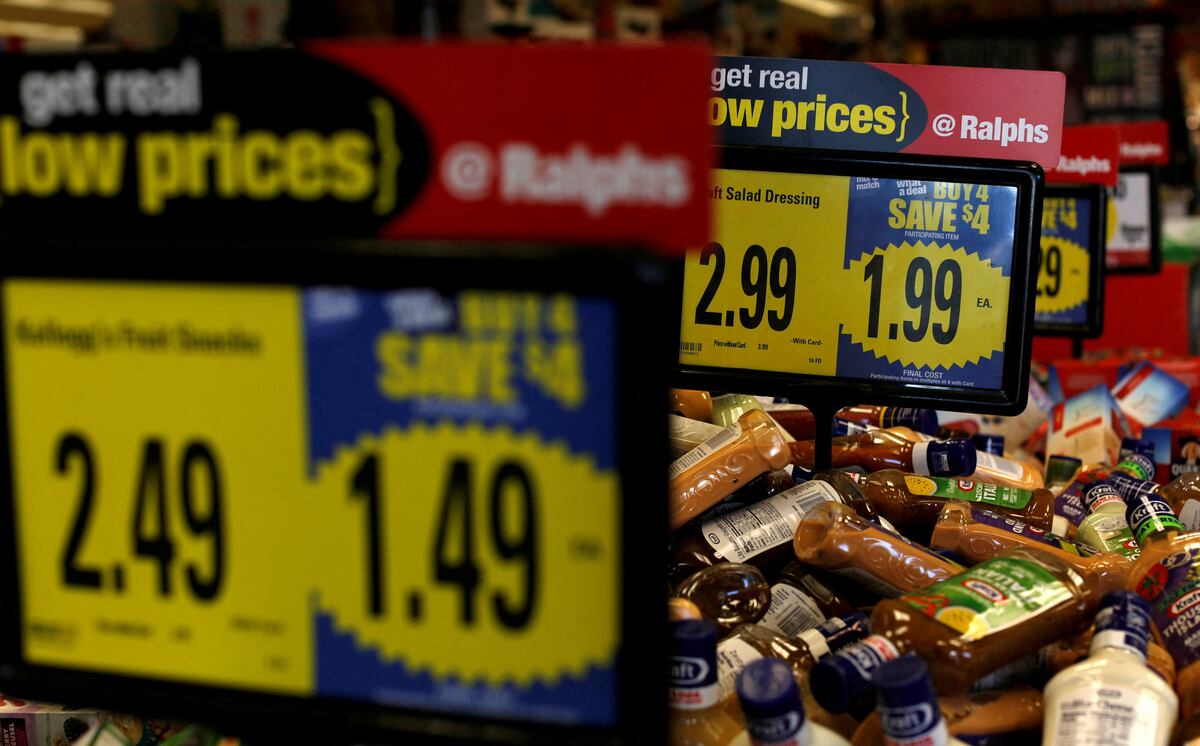Fed President Jerome Powell.
The hope that the interest rate hike would stop inflation was dashed (Photo: GettyImages, Drew Angerer)
A real danger is the inflation that rears its head in the world and in Israel, with the exception of China (which is suffering from a huge crisis in the construction industry).
The feeling that existed among a number of central banks that the interest rate hikes that were sufficient to suppress inflation, were falsified.
Now many more interest rate increases are expected in the world and in Israel during the year, at least until the third quarter of 2023.
One of Israel's problems in the inflationary field is precisely the success of the Israeli economy which continues to grow well, beyond forecasts, almost disconnected from what is happening in other economies.
In 2022, the Israeli economy grew at a tremendous rate of 6.5%, with per capita growth of 4.4% compared to per capita growth of only 2.6% in the OECD countries.
Even in the last quarter of 2022, growth exceeded expectations, reflecting an annual rate of 5.8% compared to an expected 2.5%.
The labor market is also tight, which naturally leads to inflation through wage increases.
Unemployment amounts to around 4% and the number of vacancies in January was still at a high level on the timeline of many years, over 142,000, not far from the peak a year ago.
To this we will add the wage increases that took place in the last year (and will increase at a sharp rate during the year, after the approval of the budget that will lead to wage increases in the public sector) - and here you have inflationary pressures.
Despite inflation and the increase in interest rates, private consumption has started to rise (Photo: ShutterStock)
importing inflation
The growth rate of investments, which is a second and main component of the economy's ability to grow without requiring price increases, is decreasing.
With the exception of housing, investments are moderating: they increased in the last quarter of 2022 at an annual rate of 3.5% after an increase of 15% in the third quarter of 2022 and of 13.5% in the second quarter of 2022. In fact, the Israeli economy is at the end of its ability to operate without further warming in activity, a situation that may lead
to us to accelerate inflation.
In the absence of sources of manpower and capital to keep up with growth, the immediate result, according to the economic models, is inflation.
Even the Bank of Israel clearly states in the latest report on financial stability that the Israeli economy is close to its growth potential.
Also in the last quarter of 2022, private consumption per capita, which is the standard of living, increased by a sharp rate of 8.1% after a decrease of 3.4% in the third quarter of 2022. That is, the public ignored for the time being the increase in interest rates that the Bank of Israel instituted since March 2022, the public continues to do the same: consume, buy and purchase
The result was not long in coming with the sharp increase in inflation in January, at a rate of 0.3%, why?
The index data reveal that while last year's inflation was mainly imported from abroad through shipping cost mechanisms, an increase in the prices of raw materials as well as the prices of agricultural goods, especially after Russia's invasion of Ukraine which caused a spike in energy prices, in January of this year prices of a local nature began to rise, which theirs to what is done in the world, relatively low, sometimes weak.
Increases of up to 3% were among manufacturers and service providers who decided to jump on the bandwagon of price increases and raise prices. Unusual increases were in the prices of drafting contracts, brokerage, legal services, apartment renovation, repair services for electrical products, private medical services , dental treatment, medical insurance, the cost of education and professional training, plays, concerts, religious needs, internet and telephony services, haircuts and beauty salons.
These price increases weigh on households in addition to the heaviness of an increase in imported prices due to what is done abroad, such as electricity rates, flights abroad, or food prices imported by an undeclared cartel. There is inflation and there are interest rate increases beyond what you thought. The
economy Israel is small and naturally exposed to shocks from abroad, large economies are also exposed to global shocks, at a reduced rate (usually, with the exception of India).
Inflation in the world is not letting up, the consumer and producer price indices in the US have been a negative surprise.
The Fed continues and will continue to raise interest rates in order to suppress inflation in the US, monthly inflation of 0.5% in January and 6.5% in the last year - and other price indices continue to rise, such as the index without food and without energy, which increased in the last year by 5.6%.
The Fed's expected interest rate hikes, against the background of strong economic data from the American economy, despite the interest rate so far, have already resulted in a renewed bias towards the dollar, and the demand for dollar assets is increasing.
Now the expectation is for at least two more and maybe even three more interest rate hikes this year in the US. The strengthening of the dollar as a result worries most of the world. Among the weak countries that borrowed money and capital at cheap prices for many years, it will not be possible to repay the debts they took on in dollar terms. Assistance will be required an international group of international bodies to save them from the state of loans, as they are now reaching out to Sri Lanka which has collapsed. The powerful countries will also feel the comfort of the US dollar, even though they raise interest rates, but not enough to suppress their inflation - and not enough to compete with the level of interest that accelerates inflation to the dollar.
An increase in the value of the dollar, to which most goods, transportation and maritime transportation are linked, including agricultural goods (also for payments of contracts signed in the past between suppliers and buyers), will cause an increase in the rate of inflation imported through the exchange rate mechanism, which will force most countries to raise interest rates beyond what who thought until the last few weeks, so that inflation would not continue to run wild, before it was suppressed.
More in Walla!
B-Cure Laser - Does it help knee pain?
The truth is revealed
Served on behalf of B Cure Laser
The head of the European Central Bank, Christine Lagarde.
A politician who ignored the rising inflation (Photo: GettyImages, Thierry Monasse)
Classical Europe
Annual inflation in the UK is 10.1%, five times the Bank of England's inflation target.
Inflation in the Eurozone stands at 8.5%.
The Central Bank of Europe, which has delayed raising interest rates because it is headed by an undeclared politico, Christine Lagarde, literally ignored inflation until recently.
Now he has announced that he will be aggressive in raising interest rates by half a percent once.
Weak countries in the European Union, the eastern ones on the continent, most of which before the fall of the Soviet Empire were part of the Warsaw Pact and hoped for a better life under the auspices of Western Europe (and joining the European Union), are suffering from rapid inflation: Croatia, from the rifts of neutral Yugoslavia, with 13.1%, in Romania about 15% , Bulgaria - 16.4%, Poland - 17.2%, Estonia - 18.6%, Lithuania - 20%, Latvia - 21.5% and Hungary with 25.7%.
The Western European countries are also mistaken in the inflation traps: inflation in the Netherlands - 7.6%, in Denmark - 7.7%, in Ireland - 7.8%, in Belgium - 8.1%, in Portugal - 8.4%, in Germany - 8.7%, in Finland - 9.1%, in Slovenia - also from the ruptures of Yugoslavia - 10%, in Italy - 10.1% and in Austria - 11.1%.
It is clear to anyone with eyes in their head that the European economy cannot function with such high inflation rates.
There might be a slight growth in the block, but not enough to trade well.
The European Union accounts for a third of Israel's total foreign trade.
It is no wonder that Israel's trade with the rest of the world has been damaged due to the contraction of the growth rate of activity in the economies, which includes not only Europe but also Southeast Asia and China.
The turnaround was manifested in the last quarter of 2022, with a fall in the export of goods and services from Israel at an annual rate of 10.4%, this after an increase of 1% in the third quarter of 2022 and an increase of 13.3% in the second quarter of 2022.
The drop in exports naturally also leads to a drop in imports, after all, part of the imports is intended for the use of export oriented firms.
Imports decreased in the last quarter of 2022 at an annual rate of 7.1% after an increase of 2% in the third quarter of 2022 and an increase of 6.2% in the second quarter of 2022, here too there is downward convergence.
The world is now going through a process of de-globalization, initiated by the US seeking to stop or slow down China's expansion.
The increase in the cost of capital causes a jump in the rent, which has already begun to climb (Photo: ShutterStock)
Made in America
The US is bringing many industries back to its domain through heavy subsidies that go against international conventions, after they had been outsourced for decades, mainly to China. Many countries are following suit, some of them required to do so by the US, such as Japan and South Korea, which are required to stifle the memory chip industry of China.
From here, the world economy may turn into a move of protectionism (protection of local produce), perhaps not at the level that was horrifying on the eve of World War II, but certainly one that would significantly reduce the world trade on which Israel is so dependent.
As mentioned, protectionism is a process of protecting local produce, even at the price of subsidizing local produce or tariff protections or non-tariff protections.
Each country is doing for its own economy, thereby damaging the advantage of globalization that each country produces in the field in which it specialized at competitive prices, which raises the well-being of the whole world, as it has been in recent decades.
Israel, which is already suffering from signs of renewed inflation, will now find itself with rising inflation intertwined, as we mentioned at the beginning, from the development of the Israeli economy which is still very strong, threatening wage agreements and imported inflation through the transmission mechanism of the American dollar.
In addition to this, import prices are also on the rise, due to the considerable inflation in the countries.
Pay attention to the source of inflation in 2022 in Israel, the import prices of goods and services increased during the year 2022 at a rate of 11.9%!, according to the CBS.
The increase in capital prices causes and will cause rent inflation, which is already intensifying and will adjust itself to the new capital price, while housing prices are frozen or falling.
Amazingly, there is no contradiction in this.
The Ministry of Finance and the other government ministries together with the Central Bank will have to deal with a number of problems this year that have piled up, one on top of the other, and may lead to a sharp change in the growth trend and strength of the economy.
An increase in the inflation rate will raise interest rates for borrowers in the business sector, especially for the construction industry which has weakened significantly, really close to stopping.
Credit lines will also be reduced due to the banks' need to maintain their financial stability in the medium and long term.
Even the households that rarely take out a mortgage these days, due to high interest rates and excessive house prices for their purchasing power, will continue to sit on the fence and will not purchase houses, at least until the prices drop enough to compensate for the high interest rate for taking out a mortgage.
Households will also reduce taking credit for current consumption or purchases of durable goods, so purchases of vehicles will be postponed, for example.
Business companies will start to think twice before they recruit personnel.
Already in the month of January, the demand for network and computer system technicians decreased by 8% compared to the last quarter of 2022, the demand for software developers decreased by 4%, the demand for computer, electrical, industrial and management and mechanical engineers decreased by 6%, the demand for engineers and technicians decreased by 1 %.
What is surprising is that the huge demand that existed until recently for truck and bus drivers has also decreased by 4%, perhaps there are really fewer people going to the ports to export goods.
The economy may also be affected by geopolitical uncertainty, mainly referring to Iran and the intensification of the war in Ukraine, as well as a worsening of the security situation here in Israel.
There is also uncertainty regarding the stability of the government - if at all it will be able to survive and pass laws, such as the budget law, and above all, also a chaotic uncertainty about the depth of the rift in Jewish society with regard to the reform or transformation of the legal system in Israel.
Israel is the most powerful country in the world today economically, but despite this it may go down a difficult and bumpy road in the coming year.
For this, leadership is needed.
In practice we experience division, schism, hatred of the other and verbal violence that will further slide into physical violence.
It will hurt everyone, especially the weak who will lose their source of livelihood and income amid the inflationary bleeding.
The Bank of Israel will raise the interest rate beyond what it thinks itself to prevent inflation, and it will indeed be significantly lower in a year compared to today (5.4%), but the pain for the underprivileged will be very severe.
Of money
Tags
inflation
investments
recession















